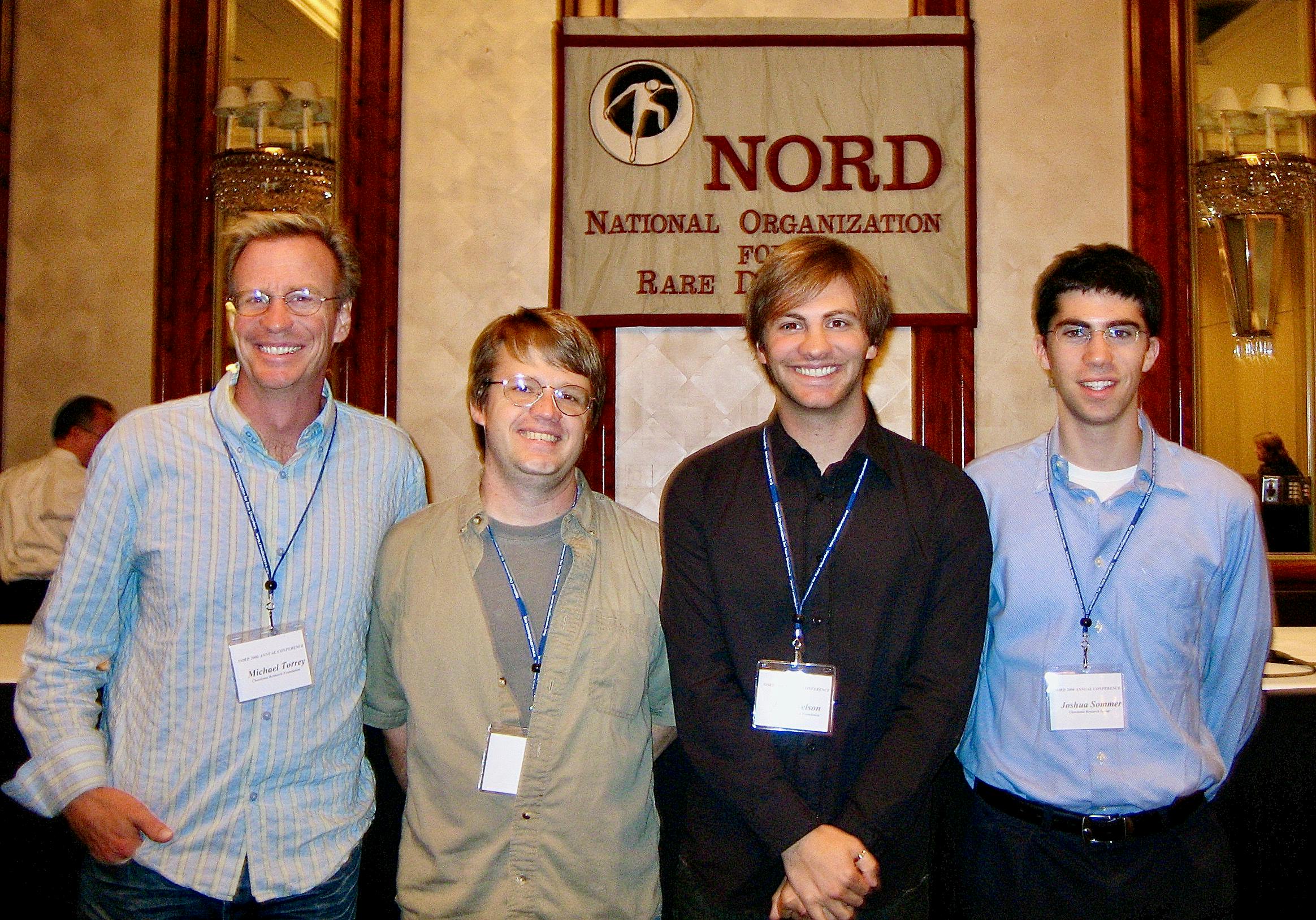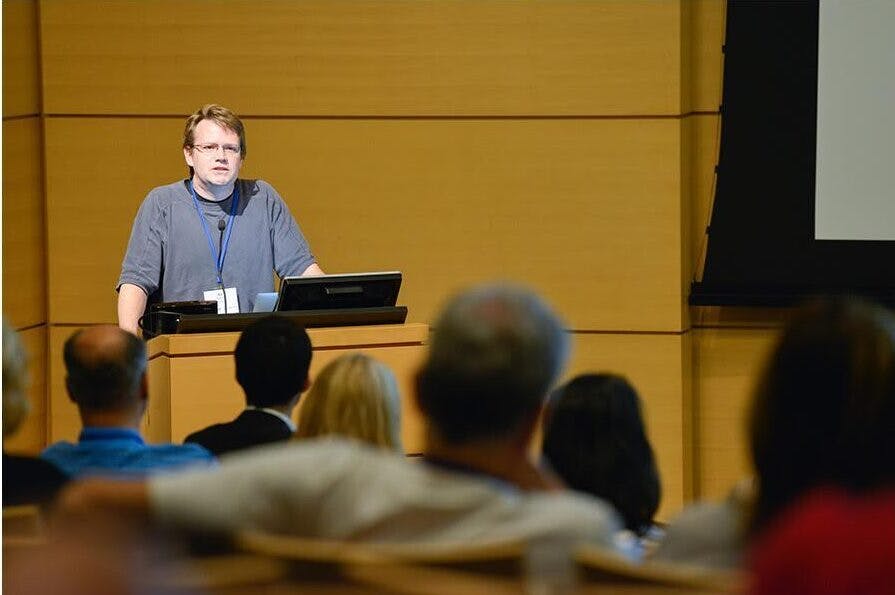
Photo: Bill Dorland and Dr. Chris Heery
Chordoma entered Bill Dorland’s life 20 years ago when he was a young physics professor at the University of Maryland. Over two decades, he navigated numerous recurrences, surgeries, courses of radiation, and experimental therapies through clinical trials. Throughout his journey, Bill remained determined to explore every option available. And as a scientist and educator, Bill approached his disease the same way he approached his work – with boundless curiosity, rigorous scientific reasoning, and his characteristic wit.
"As a scientist, I spent a lot of my time trying to deal with uncertainty," Bill once said. "I feel lucky that that's my job because it gives me constant practice in managing uncertainty, which is basically what the whole patient experience is filled with."
Bill had put down roots near Baltimore with his wife, Sarah, and daughter, Kendall, upon finishing graduate school, and his career was underway when he first started experiencing pains he could not explain. It took nearly two years of false starts and misdiagnoses before he learned he had chordoma. At the time, there was no Chordoma Foundation, and there was barely any research or community to speak of – but there was a small online patient support group on the now-defunct Microsoft Network (MSN) which provided a crucial link to others facing this rare disease.
Bill became an active and well-known member of the MSN group. His wit, positivity, smarts, and analytical perspective made him someone others respected and sought out for guidance and support. And he willingly obliged, helping to steer dozens of others through various phases of their own journeys with chordoma.
A natural leader, Bill was also sought out by members of the support group who were motivated to do something to improve the outlook for those affected by this disease. That included people like Johnny Nelson, Michael Torrey, Norma Jones, and eventually Simone and Josh Sommer. In the fall of 2006, Bill and this small group of online acquaintances met up at the annual meeting of the National Organization for Rare Disorders (NORD) with a fire to take action against the disease they all shared.

Michael Torrey, Bill Dorland, Johnny Nelson, and Josh Sommer at the NORD meeting
Bill had already scoured the University library for existing research and, like the others, arrived at the meeting with resources, ideas, passion, and urgency. There was so much to do and the group debated where to start: Research in pursuit of cures? Advocating to improve patient care? The quest to survive with more normalcy and a higher quality of life? They came away from the meeting resolving to join forces to build an organization that would work on behalf of the chordoma patient community — a resolution that ultimately gave way to the birth of the Chordoma Foundation in 2007 and our mission to improve the lives of those living with chordoma and lead the search for cures.
In the early years, Bill served as an active volunteer and vocal advocate for prioritizing efforts to unite and support the patient community. In particular, in 2008 Bill was among those who spearheaded our first Chordoma Community Conference, which connected many in our community for the first time and set the template for the nearly 20 community conferences we’ve held since.

Bill speaking at our 2016 Chordoma Community Conference in New York
Over the years, as Bill navigated his path, he also helped dozens of other patients find theirs. His most frequently offered advice was to get a second opinion from someone who has expertise in treating chordoma. Even if your first doctor is terrific and you trust them completely, it’s important to be informed about your options, he would advise. “You’re not looking for the answer,” he’d tell those who came to him for advice, “you’re looking to make sure you’ve asked the right questions.”
Bill’s impact on the chordoma community could also be seen in his willingness to participate in numerous clinical trials, including multiple brachyury vaccine trials. At times these trials helped Bill fight back against this disease, shrinking or stopping his advancing tumors and bringing hope and optimism to fellow patients following his journey, as well as to his physicians. His story inspired others to consider clinical trials as a viable option in their own treatment journeys. And his case was studied widely by his medical teams at the National Institutes of Health and Johns Hopkins. His legacy in this realm serves as a powerful reminder of the vital role patients play in advancing progress in chordoma treatment development.
Another thing Bill did without fail since the Foundation was established was to give generously in support of our mission, including as a long-time monthly Perseverance Pledge donor. He often told others that there is no more meaningful way to support this work than by giving what you can. "What does that progress mean to me?" he once said, reflecting on advancements in chordoma research made possible by donors. "It saved my life three times."
Bill continued to teach throughout his entire journey with chordoma, accepting appointments at multiple universities and, in his final days, being awarded a prestigious Maxwell Prize for his significant contributions to physics. His students provided him with a constant source of energy and purpose – the chance to make an impact and continue learning and growing despite his obstacles and increasing setbacks to his physical health. But even when carrying his ostomy (a surgically created opening to allow waste to leave the body) supplies around campus in a backpack or relying on walking devices to get around the classroom, Bill transcended his circumstances by leaning on his curiosity to cultivate a new sense of identity and balance.
“The thing about going through something like chordoma is that you become yourself,” he said. “Whatever that is, the stress strips away all the pretense and the manufactured bits, and you’re left with who you really are at the core. For me, I’m fortunate to have learned I’m a naturally happy person. I love my work. I love science and teaching. I’m lucky to have something that doesn’t fail me – it’s always there, and it’s always with me, and it’s wonderful.”
As we mourn Bill’s passing, we also celebrate the indelible mark he left on our community. His approach to living with chordoma – with an unwavering commitment to doing everything he could to improve the outlook for others – will continue to inspire patients, caregivers, researchers, and healthcare providers for years to come. And when chordoma is ultimately solved and people no longer face the challenges Bill did, it will be in no small part because of him.
Until then, we will continue forging ahead in his memory.